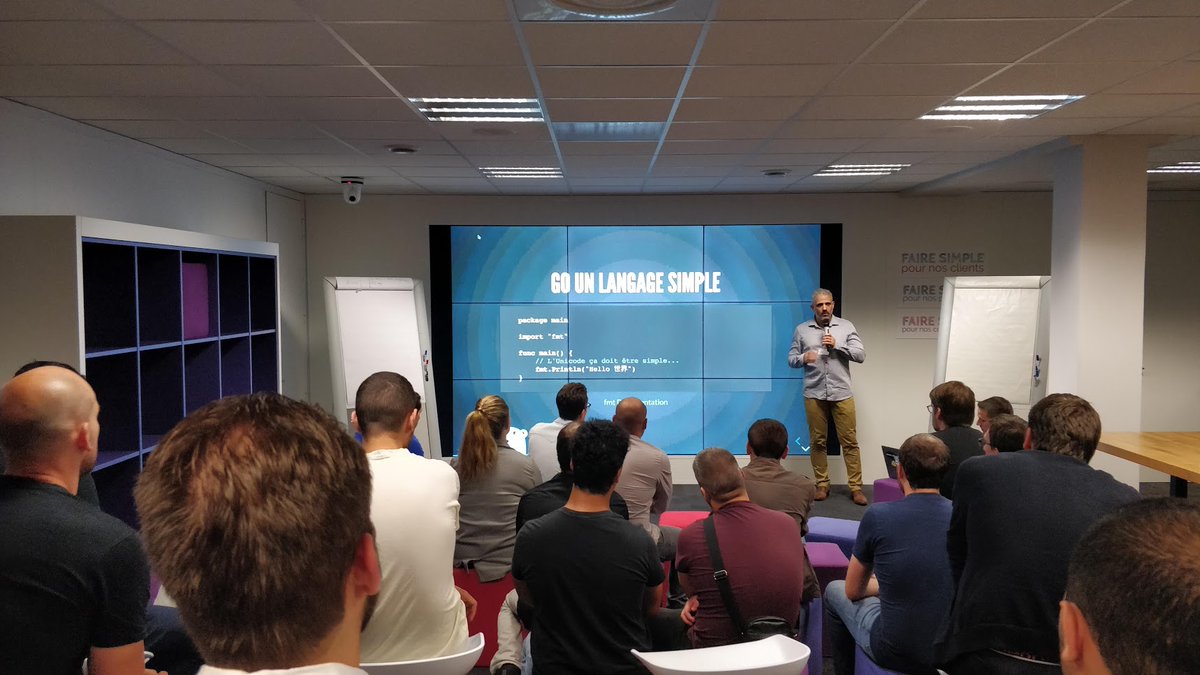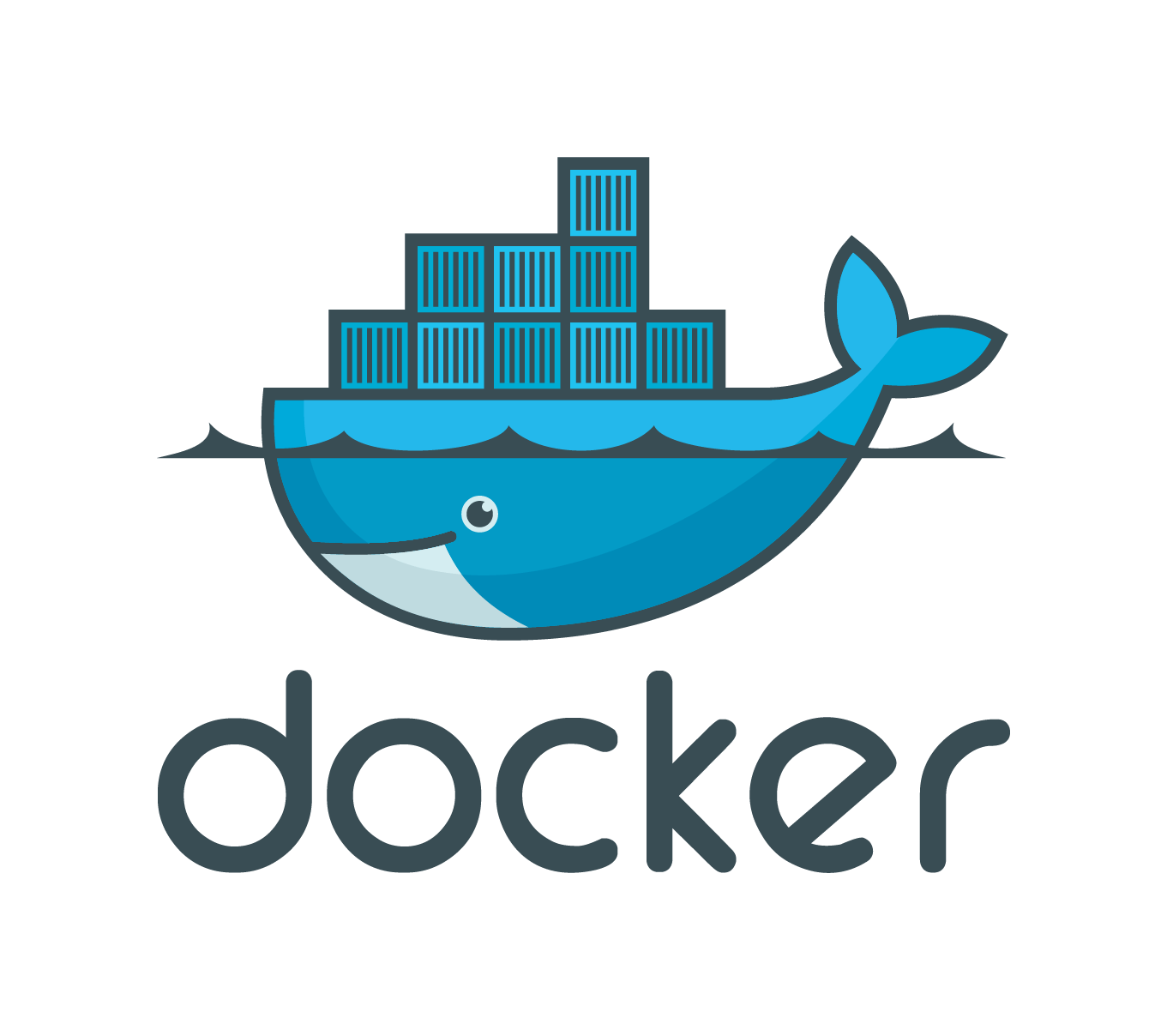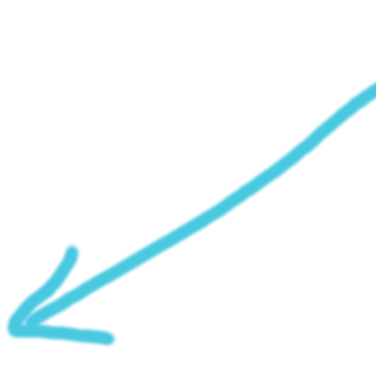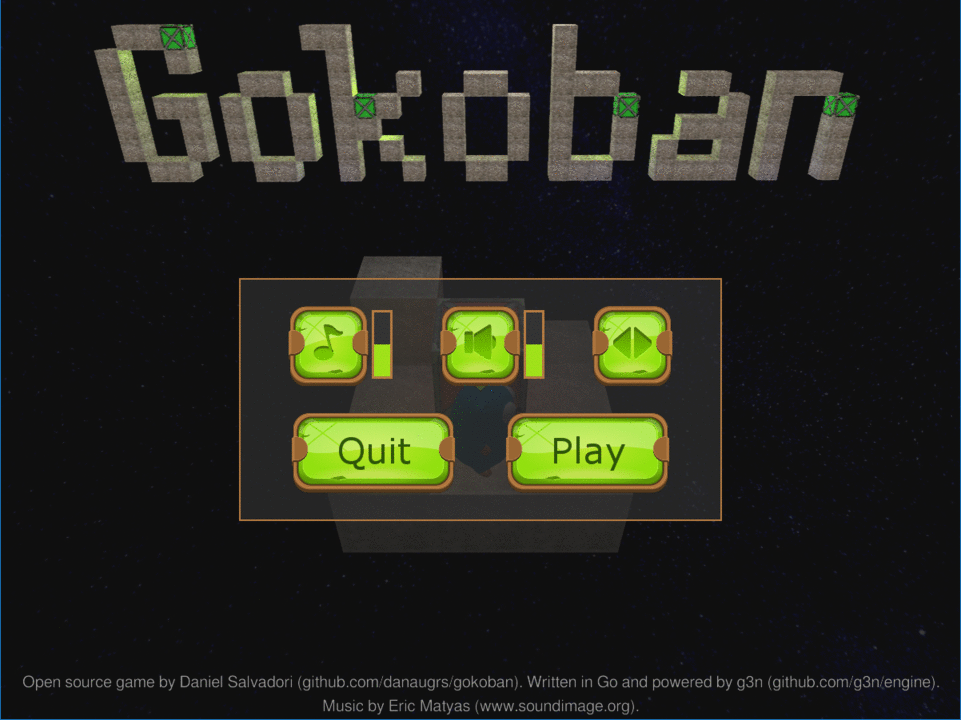
A la découverte du Go
Arnaud "Arhuman" Assad (arhuman@gmail.com)
Aussi sur Twitter - Linkedin - Github
Le langage Go
- Créé en 2009 par Google
(Robert Griesemer, Rob Pike et Ken Thompson) - Inspiré du C et de Pascal
- Langage compilé
- Récupérateur de mémoire (garbage-collected)
OSCON 2010
Go aims to combine the safety and performance of a statically typed compiled language with the expressiveness and convenience of a dynamically typed interpreted language.
It also aims to be suitable for modern systems - large scale - programming.
-- Rob Pike
Go(lang) exemple
package main
import "fmt"
func main() {
list := []int{31, 41, 59, 26, 53, 58, 97, 93, 23, 84}
fmt.Println("unsorted:", list)
bubblesort(list)
fmt.Println("sorted! ", list)
}
func bubblesort(a []int) {
for itemCount := len(a) - 1; ; itemCount-- {
hasChanged := false
for index := 0; index < itemCount; index++ {
if a[index] > a[index+1] {
a[index], a[index+1] = a[index+1], a[index]
hasChanged = true
}
}
if hasChanged == false {
break
}
}
}
Le langage Go!
- Créé en 2003 par Keith Clark et Francis McCabe.
- Programmation concurrentielle
Go! - exemple
Gender::= male | female.
person <˜ {dayOfBirth:[]=>day. age:[]=>integer.
gender:[]=>Gender. name:[]=>string.
home:[]=>string. lives:[string]{}}.
person:[string,day,Gender,string]$=person.
person(Nm,Born,Sx,Hm)..{
dayOfBirth()=>Born.
age() => yearsBetween(now(),Born).
gender()=>Sx.
name()=>Nm.
home()=>Hm.
lives(Pl) :- Pl=home().
yearsBetween:[integer,day]=>integer.
yearsBetween(...) => ..
}.
newPerson:[string,day,Gender,string]=>person.
newPerson(Nm,Born,Sx,Hm)=>$person(Nm,Born,Sx,Hm).
Mais aussi

Et aussi
- Go Go Power Rangers!!!
- Python is the way to go
- Go sport / Go voyages
- Pokemon Go
Et donc Golang...
- Uniquement pour le SEO
- Assez répandu
- Pas recommandé par Rob Pike
Pourquoi Go ?
- La simplicité
- Les interfaces
- Les goroutines / channels
- La toolchain
- La librairie standard
- Rapidité de compilation
Go un langage simple
package main
import "fmt"
func main() {
// L'Unicode ça doit être simple...
fmt.Println("Hello 世界")
}
Une seule boucle
sum := 0
for i := 0; i < 10; i++ {
sum += i
}
for ; sum > 0; {
sum -= 1
}
for sum < 1000 {
sum += 1
}
Types de base
bool
string
int int8 int16 int32 int64
uint uint8 uint16 uint32 uint64 uintptr
byte // alias pour uint8
rune // alias pour int32
// représente un "code point" Unicode
float32 float64
complex64 complex128
Des types composés
package main
import "fmt"
type Sommet struct {
X int
Y int
}
func main() {
v := Sommet{1, 2}
v.X = 4
fmt.Println(v.X)
}
Des slices (et des tableaux)
// Array : taille fixe
var a [10]int
// Slice : taille variable
var b[]int
Des slices
// Des slices de slices
game := [][]string{
[]string{"_", "_", "_"},
[]string{"_", "_", "_"},
[]string{"_", "_", "_"},
}
// Morceau de slice retourne un slice
game[1:3] // ou game[1:]
// Ajout
game = append(game, []string{" ", " "," "});
// Boucle for avec range
for i, v := range game {
fmt.Printf("index=%d valeur=%v\n", i, v)
}
Des maps
type Sommet struct {
Lat, Long float64
}
var m map[string]Sommet
func main() {
m = make(map[string]Sommet)
m["Bell Labs"] = Sommet{
40.68433, -74.39967,
}
fmt.Println(m["Bell Labs"])
}
Des maps
// Affectation
m[key] = elem
// Récupération
elem = m[key]
// Suppression
delete(m, key)
// Test existence
elem, ok = m[key] // _, ok = m[key]
First class functions
func compute(fn func(float64, float64) float64) float64 {
return fn(3, 4)
}
func main() {
hypot := func(x, y float64) float64 {
return math.Sqrt(x*x + y*y)
}
fmt.Println(hypot(5, 12))
fmt.Println(compute(hypot))
fmt.Println(compute(math.Pow))
}
Programation Orientée Objet
- Héritage
- Encapsultation
- Polymorphisme
POO en Go ?
- Go pas d'héritage (interface)
- Pas de classe (struct)
- Polymorphisme
Interfaces
- Pour principe de substitution de Liskov
(pas d'héritage) - Implicites
(pas besoin de modifier les packages externes) - Peuvent être déroutantes
Struct + fonction => Méthode
type Sommet struct {
X, Y float64
}
func (s Sommet) Abs() float64 {
return math.Sqrt(s.X*s.X + s.Y*s.Y)
}
Interface = liste de méthodes
package main
import (
"fmt"
"math"
)
type cercle struct {
rayon float64
}
func (c cercle) aire() float64 {
return math.Pi * c.rayon * c.rayon
}
func (c cercle) perimetre() float64 {
return 2 * math.Pi * c.rayon
}
type rectangle struct {
largeur, hauteur float64
}
func (r rectangle) aire() float64 {
return r.largeur * r.hauteur
}
func (r rectangle) perimetre() float64 {
return 2*r.largeur + 2*r.hauteur
}
type surface interface {
aire() float64
perimetre() float64
}
func affiche(s surface) {
fmt.Println(s)
fmt.Println(s.aire())
fmt.Println(s.perimetre())
}
func main() {
c := cercle{rayon: 3}
r := rectangle{largeur: 1, hauteur: 2}
affiche(r)
affiche(c)
}
Goroutines
- Concurrency != parallelism
- Plus légers que les thread
- Usage de la stack optimisé
- Switchs peu couteux
Goroutines
- Des millions de goroutines possible
- 50 fois plus rapide à lancer qu'un thread
- 2-4K vs 2M sur la stack
- Changement de contexte peu couteux
- Un thread système gère plusieurs goroutines
Goroutine - Exemple
package main
import (
"fmt"
"time"
)
func longTraitement(d int, s string) {
time.Sleep(time.Duration(d) * time.Second)
fmt.Println(s)
}
func main() {
go longTraitement(3, "Premier long Traitement")
go longTraitement(2, "Deuxième long Traitement")
go longTraitement(1, "Troisième long Traitement")
fmt.Println("Dans main()")
// Laissons le temps aux goroutines de se terminer
time.Sleep(time.Duration(4) * time.Second)
}
// Affiche :
// Dans main()
// Troisième long Traitement
// Deuxième long Traitement
// Premier long Traitement
Channels
"Don't communicate by sharing memory, share memory by communicating."
-- Rob Pike
Channels
- Vont de paire avec les goroutines
- First class elements
- Bufferisés ou pas
- Pas de callback !
Channels
package main
import "fmt"
func sum(s []int, c chan int) {
sum := 0
for _, v := range s {
sum += v
}
c <- sum // send sum to c
}
func main() {
s := []int{7, 2, 8, -9, 4, 0}
c := make(chan int)
go sum(s[:len(s)/2], c)
go sum(s[len(s)/2:], c)
x, y := <-c, <-c // receive from c
fmt.Println(x, y, x+y)
}
Toolchain
- Point d'entrée unique
- GOPATH
- go get
- go build
- go run
- go ...
- go test
Toolchain
- Intégrable à l'éditeur
- go import
- go format
- Cross compilation
- Temps de compilation
Temps de compilation
- Analyse plus simple
- Pas de dépendances inutilisées
- Pas de dépendances cycliques
- Syntaxe régulière
- Un import => un fichier à charger
- Format objet avec les exports en début de fichier
Librairie standard bien fournie
- Liste des packages standards
- GoDoc - Index et moteur de recherche des packages
- Go Search - Moteur de recherche de code
- And github...
HTTP server
package main
import (
"net/http"
)
func main() {
fs := http.FileServer(http.Dir("static/"))
http.Handle("/", fs)
// http.Handle("/static/", http.StripPrefix("/static/", fs))
http.ListenAndServe(":8080", nil)
}
La killer App ?

Tout un écosytème
Communauté
- Site officiel Golang (blog, documentation, tour...)
- Go Tour
- Go proverbs
- French Go
- Meetup GolangMarseille
- **Autopromotion éhontée**
Un langage en constante amélioration
- Release fréquentes
- Modules
- Webassembly
- Go 2
- Generics avec contrat
- Gestion des erreurs moins fastidieuse
Une chouette mascotte

Go pourquoi faire ?
- Backend/Système
- Application avec GUI
- Browser
- Embarqué
- Presque tout sauf du bas niveau
Application avec GUI
Même des jeux 3D

Browser
- Webassembly
GOOS=js GOARCH=wasm go build -o main.wasm - Gopher.js
Embarqué
Credits
- kljensen/go-is-awesome pour l'idée du Gopher sur les slides
- Reveal.js pour le bonheur de ne plus utiliser PowerPoint
Vous êtes libre de modifier/copier/redistribuer librement cette présentation.
Merci
Des questions ?
N'hésitez pas à prendre contact via Linkedin
Most wanted language *
| Position | Langage | % |
|---|---|---|
| 1 | JavaScript | 17.8% |
| 2 | Go | 15.0% |
| 3 | TypeScript | 14.6% |
| 4 | Kotlin | 11.1% |
| 5 | Rust | 9.5% |
| 6 | C++ | 9.1% |
| 7 | WebAssembly | 8.9% |
| 9 | Java | 8.3% |
| 9 | SQL | 7.6% |
| 10 | C# | 7.0% |
| 11 | HTML/CSS | 6.6% |
| 12 | Swift | 5.8% |
| 13 | C | 5.0% |
* StackOverflow survey 2019
Tout n'est pas parfait
- La gestion des erreurs
- Les générics
- Manque de packages dans certains domaines
(Machine Learning...)